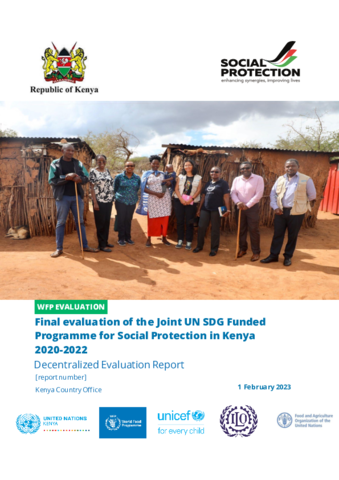
The evaluation covers Kenya SDG joint programme for social protection that was implemented between January 2020 - September 2022. It was carried out in 2022/2023 and covered the following activities: a) Capacity strengthening and b) social protection.
The evaluation has had the dual objectives of accountability and learning. It focused on assessing the relevance, effectiveness, efficiency, coherence, sustainability, and lessons learned. Overarching evaluation questions focused on: (i) how relevant were the Joint Programme to priorities/polices at the national level and to the needs of the main vulnerable groups? (ii) To what extent did the joint programme contribute to achieving its development objectives? (iii) was the programme implemented in timely way and were the activities cost-efficient? (iv) To what extent are PUNO’s activity coherent with key policies/programming of each partner operating in the context? (v) what are lessons learned from the project up to this point? And (vi), to what extent has the strategy adopted by the joint programme contributed to sustainability of result?
Key Evaluation Findings Included:
- The evaluation found that the joint programme was relevant to the Kenyan context and highly coherent with overarching policies, strategies, and programmes. Especially, a Human Rights Based Approach (HRBA) was visible in programme objectives of Joint Programme activities.
- Overall, with the government of Kenya leadership and strong collaboration between actors, the Joint Programme was effective, contributing to support the Government of Kenya to reach key SDG, specifically SDG 1, 2, 8, 10 and 17, and has served a catalytic and/or foundational role in expanding or enabling the expansion of the social protection sector in Kenya.
- Despite the challenges such as COVID-19 and internal UN administrative mechanism, key deliverables have been finalized within the programme cycle. In terms of monitoring process, the current approach may not have been the most efficient approach in terms of resources needed for monitoring as multiple individuals needed to be engaged.
- The Joint Programme has contributed to the sustainability of an enhanced national social protection database and development of legislation.
Key recommendations from the evaluation included:
- At pre-programme design phase, the continuation of the Joint Programme should be considered through the implementation of a second phase with a duration of 5 years minimum. In addition, additional government actors in social protection sector should be included in the development of joint programme and different the process of resource mobilization should include different stakeholders as well as Government of Kenya.
- While programming the joint programme, the programme should continue to enjoy government leadership/buy-in. Moreover, the future Joint Programme should further explore the articulation between different activities. To enable gender mainstreaming, the evaluation suggests a thorough gender analysis covering all relevant areas. Last, the expanded inclusion of end users will ensure the HRBA across the whole implementation of the programme, not only as part of specific activities, and improved ownerships and legitimacy of the intervention.
